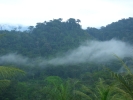 According to World Rainforest Movement, frica produces some 5 percent of global natural rubber production, with the main producing countries being Nigeria (300,000 hectares), Liberia (100,000) and Cote d'Ivoire (70,000). New rubber plantation projects are being presented and promoted in many other African countries.
According to World Rainforest Movement, frica produces some 5 percent of global natural rubber production, with the main producing countries being Nigeria (300,000 hectares), Liberia (100,000) and Cote d'Ivoire (70,000). New rubber plantation projects are being presented and promoted in many other African countries.
One major actor in Africa appears to be the French corporation Michelin, with rubber plantations in Nigeria, Cote d'Ivoire, Ghana and Benin. The Singaporian Golden Millennium Group owns 18,000 hectares of plantations in Cameroon. In the case of the Bridgestone/Firestone corporation, its plantations seem to be established only in Liberia.
Liberian NGO SAMFU produced in 2008 a report on the Bridgestone/Firestone plantations in Liberia.
Tappers work approximately 12 hours a day without safety equipment (gloves, goggles, rain boots, rain coats and other safety gears) unless they are bought by the tappers themselves. They have to carry all the latex they produce on their bare shoulders on a stick with two buckets weighing 70 lbs [31.7 kg] each.
This primitive means of transporting latex has not changed since 1926. With 140 lbs [63.4 kgs] yoked across their shoulders, laborers walk to weigh stations that may be up to three miles [4.8 kms] away from the grove of rubber trees. Firestone provides no alternative means of transportation.
A tapper wakes at 4 o'clock every morning to get prepared for tapping up to perhaps 750 trees daily on a normal tapping day. However, only half of the daily rate of $3.38 is paid if a tapper fails to complete the full daily quota. Faced with these onerous quotas, tappers have little choice but to allow family members to assist them in completing their quota or hire a sub-contractor.
The tappers work every day of the year including national holidays, with the exception of Christmas day, producing high volumes of latex. An average tapper's monthly production can be valued at US/$2,296.80 on the ground in Liberia and US/$3,915.00 at world market prices while the tapper is paid US/$125. Out of the monthly wage of US/$125, he may have to pay one or two sub-contractors who helped him tap.
"These people are treating us like slaves because we have nobody to talk for us and we have nowhere to find a new job. You produce more than 5 tons of latex for the company a month and they don't even pay you the price of one ton", said bitterly a tapper. Besides latex production, tappers are required to apply chemicals (both fungicide and stimulants) on the trees for protection and to increase production. In addition they are required to under-brush the trees they tap. This workload means that many of the tappers have to hire sub-contractors to get all the work done. In the instance where the tapper's family is large and can not afford the deduction of their rice supply or salary for a sub-contractor, the wife is obliged to abandon her children to assist her husband in completing his quota."
At the end of April 2007, workers engaged in a strike. During the strike on April 27, 2007, police reportedly brutalized peaceful striking workers with batons and sticks, chased harmless workers throughout the city of Harbel - where the Firestone rubber processing plant is located-, broke into houses and beat many innocent people which resulted in dozens of injuries. Two dozen workers were injured so badly that they were forced to miss work while they underwent treatment. Subsequently, one of the injured workers died as a result of wounds suffered during the attack. In addition, tear gas was fired into Harbel's densely populated communities without regard for children, women and the elderly. It appears that many innocent workers were not only unnecessarily arrested, but unreasonably detained."


